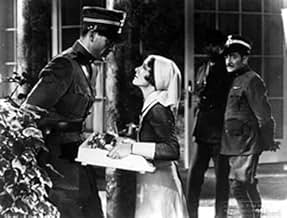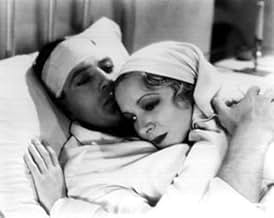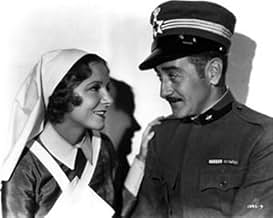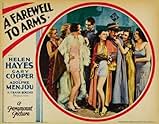IMDb RATING
6.4/10
7.3K
YOUR RATING
An American ambulance driver and an English nurse fall in love in Italy during World War I.An American ambulance driver and an English nurse fall in love in Italy during World War I.An American ambulance driver and an English nurse fall in love in Italy during World War I.
- Won 2 Oscars
- 7 wins & 2 nominations total
Alice Adair
- Cafe Girl
- (uncredited)
Henry Armetta
- Bonello
- (uncredited)
Herman Bing
- Swiss Postal Clerk
- (uncredited)
Agostino Borgato
- Giulio
- (uncredited)
Robert Cauterio
- Gordini
- (uncredited)
Marcelle Corday
- Swiss Nurse
- (uncredited)
Gino Corrado
- Italian Soldier
- (uncredited)
Peggy Cunningham
- Molly
- (uncredited)
George Humbert
- Piani
- (uncredited)
William Irving
- Frustrated Opera Singer
- (uncredited)
Featured reviews
Based on the Ernest Hemingway novel and starring Gary Cooper, this has the potential to be a classic. The setting and sentiment are reasonably original, especially for their time, and the movie is reasonably gritty.
Yet, it doesn't feel like a classic. The romance seems trite and contrived. Overly schmaltzy and sometimes just plain dull.
The acting is patchy. Gary Cooper is okay, but Helen Hayes' performance is quite flat. Most entertaining performance comes from Adolphe Menjou as Rinaldi.
It was probably quite good in its time, and might well be regarded as one of the first anti-war movies, but it now feels quite dated.
Yet, it doesn't feel like a classic. The romance seems trite and contrived. Overly schmaltzy and sometimes just plain dull.
The acting is patchy. Gary Cooper is okay, but Helen Hayes' performance is quite flat. Most entertaining performance comes from Adolphe Menjou as Rinaldi.
It was probably quite good in its time, and might well be regarded as one of the first anti-war movies, but it now feels quite dated.
A Farewell to Arms features the expected good performances from Gary Cooper, Helen Hayes, and Adolphe Menjou. For its time, it also features impressive sets. The dialogue also does justice to its source material, the Hemingway novel of the same name. This movie must've been appreciated much more at the time of its release, given the imminence of war sentiment and Hitler's rising power in Germany. All in all, a very good, though not great film, 7/10.
Watch for some James Dean look-alike glances in this black and white movie. It also plays a lot like "The English Patient", but not as boring. The continual bombings and chaos of the fighting was very realistic, but it didn't move the plot along as well as it might have.
Helen Hayes as the love interest does a delightful job, but it's hard not to judge this picture by the technical improvements of today's cinematographers. I too have either outgrown Hemingway, or a lot of his dialogue was cut. I suggest you go back and give the book a read, and decide for yourself. I have promised to return and see the movie again, afterwards. Gary Cooper was a really great-looking, and good acting guy.....and I've never appreciated him before so much. He had a lot of stage business that made him appear quite natural.
Adolph Menjou as the fun-loving captain did an admirable job, as well.
Helen Hayes as the love interest does a delightful job, but it's hard not to judge this picture by the technical improvements of today's cinematographers. I too have either outgrown Hemingway, or a lot of his dialogue was cut. I suggest you go back and give the book a read, and decide for yourself. I have promised to return and see the movie again, afterwards. Gary Cooper was a really great-looking, and good acting guy.....and I've never appreciated him before so much. He had a lot of stage business that made him appear quite natural.
Adolph Menjou as the fun-loving captain did an admirable job, as well.
This film tells the story of Lt Frederic Henry, an American who has enlisted as an ambulance driver in the Italian Army during the First World War. One day he and his friend Major Rinaldi date a pair of English Nurses; Fredric and Nurse Catherine Barkley get on well and quickly fall in love. He is soon returned to the action but following an injury he is hospitalised in the Milan hospital where Catherine works. Here their love deepens. When he returns to the front again they write to each other but Rinaldi ensures their letters don't get through leading to Fredric making some drastic and dangerous choices.
While this film is set in the war, and features some impressive battle scenes it is at its heart a love story. This plays out well and there is a good chemistry between Gary Cooper and Helen Hayes as Fredric and Catherine. Adolphe Menjou is solid as Rinaldi; a slightly ambiguous character who serves to bring the two protagonists together and later keep them apart. While the battle scenes may not be brutal and large scale as those in more modern films they are intense thanks to the way it focuses on Fredric and those around him. The camera work is very inventive; a highlight being the way we see Catherine from Frederic's point of view as she enters his hospital room and kisses him. Overall I'd definitely recommend this to fans of classic cinema.
While this film is set in the war, and features some impressive battle scenes it is at its heart a love story. This plays out well and there is a good chemistry between Gary Cooper and Helen Hayes as Fredric and Catherine. Adolphe Menjou is solid as Rinaldi; a slightly ambiguous character who serves to bring the two protagonists together and later keep them apart. While the battle scenes may not be brutal and large scale as those in more modern films they are intense thanks to the way it focuses on Fredric and those around him. The camera work is very inventive; a highlight being the way we see Catherine from Frederic's point of view as she enters his hospital room and kisses him. Overall I'd definitely recommend this to fans of classic cinema.
The 1932 film version of Ernest Hemmingway's A FAREWELL TO ARMS will never challenge the likes of ALL QUIET ON THE WESTERN FRONT--but while it fails to capture the horrors of World War I it is remarkably effective at capturing the novel's sparse and unyielding prose. A good deal of the credit goes to writers Garrett and Glaizer and director Borzage--but the real interest here is not so much in the cinematic interpretation of the Hemmingway novel as it is in the cast, which is remarkable.
Actress Helen Hayes was already among the leading lights of the New York stage when she was lured to Hollywood for a handful of films in the early 1930s--and it is easy to see what all the fuss was about. Plaintive beauty aside, unlike most stage and screen actors of the era she is completely unaffected in her performance and proves more than powerful enough to overcome the more melodramatic moments of the script. She is costarred with Gary Cooper in one of his earliest leading roles, and while the pairing is unexpected, it is also unexpectedly good: they have tremendous screen chemistry, and in spite of the film's dated approach they easily draw you into this story of an ill-fated wartime romance between a nurse and an ambulance driver.
The film is also well supplied with a solid supporting cast that includes Adolphe Menjou, Jack La Rue, and Mary Philips, and while clearly filmed on a slim budget--something most obvious in the battlefront sequences--the camera work is remarkably good. Unfortunately, all this counts for nothing unless you can find a print of the film that you can stand to watch. It is sad but true: the 1932 A FAREWELL TO ARMS seems to have fallen into public domain, and the result is a host of DVD and VHS releases that range from the merely adequate to the incredibly dire.
Gary F. Taylor, aka GFT, Amazon Reviewer
Actress Helen Hayes was already among the leading lights of the New York stage when she was lured to Hollywood for a handful of films in the early 1930s--and it is easy to see what all the fuss was about. Plaintive beauty aside, unlike most stage and screen actors of the era she is completely unaffected in her performance and proves more than powerful enough to overcome the more melodramatic moments of the script. She is costarred with Gary Cooper in one of his earliest leading roles, and while the pairing is unexpected, it is also unexpectedly good: they have tremendous screen chemistry, and in spite of the film's dated approach they easily draw you into this story of an ill-fated wartime romance between a nurse and an ambulance driver.
The film is also well supplied with a solid supporting cast that includes Adolphe Menjou, Jack La Rue, and Mary Philips, and while clearly filmed on a slim budget--something most obvious in the battlefront sequences--the camera work is remarkably good. Unfortunately, all this counts for nothing unless you can find a print of the film that you can stand to watch. It is sad but true: the 1932 A FAREWELL TO ARMS seems to have fallen into public domain, and the result is a host of DVD and VHS releases that range from the merely adequate to the incredibly dire.
Gary F. Taylor, aka GFT, Amazon Reviewer
Did you know
- TriviaErnest Hemingway hated this interpretation of his novel, as he felt it was overly romantic. That didn't stop him, however, from becoming lifelong friends with Gary Cooper, whom he met several years later. In fact, it was Hemingway who would insist that Cooper be cast in the lead of the adaptation of his novel Pour qui sonne le glas (1943) 11 years later. However, the two made a point of never discussing this film.
- GoofsA night attack is shown. During World War I there was very little flying at night and the night attacks that did occur were limited to big cities. It was almost impossible for a plane to attack specific targets in a large city, so effectively attacking people on a road in the dark was not possible, and did not happen.
- Quotes
Frederic: We've never been apart, really. Not since we met.
Catherine: Not since we met.
Frederic: And never can be.
Catherine: Never apart.
Frederic: In life and in death. Say it Cat.
Catherine: In life and in death, we'll never be parted.
Frederic: You do believe that, don't you, Cat?
Catherine: I believe it, and I'm not afraid.
- Crazy creditsIn the original 1932 credits, the credits are punctuated by aerial bomb blasts, and every time there is a blast, a credit disappears to be replaced by the next one.
- Alternate versionsSPOILER: Paramount decided, after much disagreement, to keep Hemingway's original ending and fade out after the death of Catherine Barkley. This ending was kept for the European release, but a new ending in which Barkley lives was later added to the U.S. release.
- ConnectionsEdited into Your Afternoon Movie: Farewell to Arms (2023)
Details
- Release date
- Country of origin
- Official site
- Languages
- Also known as
- L'Adieu aux armes
- Filming locations
- Production company
- See more company credits at IMDbPro
Box office
- Budget
- $799,520 (estimated)
- Runtime
- 1h 20m(80 min)
- Color
- Aspect ratio
- 1.37 : 1
Contribute to this page
Suggest an edit or add missing content




























